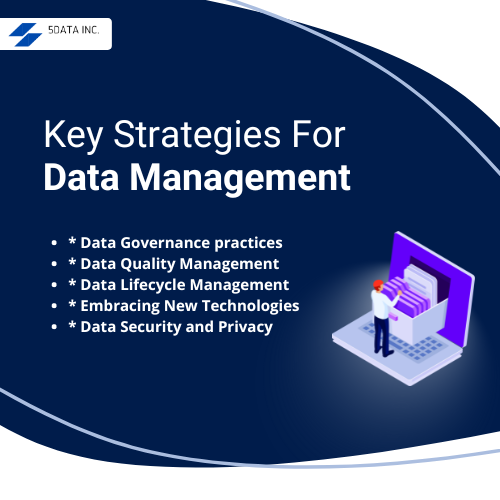Key Takeaways
- Data management enhances decisions, efficiency, and compliance.
- Key strategies: governance, quality, lifecycle management, new tech, and security.
- Data governance involves frameworks, data stewards, policies, and training.
- Data quality management includes cleansing, validation, profiling, and audits.
- Cloud governance, machine learning, and big data analytics enhance competitiveness.
The Power Of Effective Data Management
Data Management encompasses the entire lifecycle, from creating and collecting data operations to storage, processing, analysis, and disposal. It ensures that your data is managed with the following features:
- Accuracy: Free from errors and inconsistencies.
- Completeness: Contains all the necessary information.
- Accessible: Readily available to authorized users when needed.
- Secure: Protected from unauthorized access, modification, or deletion.
By implementing robust data management practices, organizations can move data processes to achieve a multitude of benefits, like
- Data-driven decision making: Gain valuable information from data mining to make informed business decisions.
- Improved efficiency: Streamline processes and optimize resource allocation based on data-driven insights.
- Enhanced customer experience: Personalize interactions and deliver targeted services based on customer data.
- Increased revenue: Identify patterns and new opportunities and develop data-driven marketing strategies.
- Reduced costs: Minimize errors and rework associated with poor data quality issues.
- Ensure compliance with data protection regulations: Adhere to all necessary legal requirements.
The Top Mobile Application Testing Companies provide comprehensive testing services to ensure mobile apps’ reliability, performance, and security across various devices and platforms.
Key Strategies For Data Management
Let’s explore some key strategies to unlock the full potential of data management practices and strategy.
Data Governance practices
Data governance is critical to effective data management. A solid foundation in data governance establishes the framework for maintaining data quality, security, and privacy and enables organizations to leverage data for decision-making confidently.
Implementing a robust data governance framework involves several key steps:
- Defining Data Governance Framework: Establishing a clear framework that outlines roles, responsibilities, and processes for managing data.
- Data Stewardship: Appointing data stewards responsible for maintaining data quality and enforcing data governance policies.
- Policy Development: Creating and enforcing data usage, sharing, and security policies.
- Training and Awareness: Educating employees about data management and data governance.
Data Quality Management
Data quality is paramount for deriving accurate and meaningful information. Data quality can lead to correct conclusions and misguided decisions. Organizations should focus on the processes and regular data quality assessments that involve:
- Data Cleansing: Removing duplicates, correcting errors, and standardizing data formats for continuous improvement.
- Validation Processes: Implementing checks and balances to ensure data consistency and reliability.
- Data Profiling: Examining data to identify patterns, discrepancies, and irregularities.
- Data Audits: Periodically reviewing data quality and compliance with established standards.
Data Lifecycle Management
It involves managing data from creation to disposal. It ensures that the relevant data is handled appropriately at each stage, from acquisition and processing to archiving and deletion. Managing data throughout its lifecycle ensures its ongoing integrity and value. It includes:
- Data Acquisition: Collecting data from various sources.
- Data Processing: It involves converting raw data into a format that is ready for use.
- Data Storage:
- Data Archiving: Safely storing data that is no longer actively used but may be needed for future reference.
- Data Disposal: Securely delete data that is no longer needed in compliance with data protection regulations.
Data Lifecycle Management Services ensure that data is efficiently handled from creation to disposal, maintaining its integrity and security throughout its journey.
Embracing New Technologies
Data management solutions like data lakes, cloud storage, and data analytics tools can significantly enhance your data management capabilities.
- Cloud Data Governance: Leveraging cloud-based tools for centralized data governance and improved accessibility.
- Machine Learning: Utilizing machine learning algorithms for data cleansing, anomaly detection, and identifying patterns.
- Big Data Analytics: Extracting insights from large, complex datasets to gain a competitive advantage.
Data Security and Privacy
Ensuring data is secure from unauthorized access and breaches is crucial for ensuring data integrity, maintaining trust, and complying with regulations. Implementing robust data security measures and adhering to data protection laws are essential for safeguarding data. Organizations must follow data regulations such as GDPR and CCPA to protect data and minimize legal risks.
- Access Controls: Limiting access to data solely to authorized personnel.
- Encryption: Using encryption techniques to protect data during transmission and storage.
- Regular Audits: Conducting security audits to identify vulnerabilities and ensure compliance with security policies.
- Data Mapping: Understanding what data is collected, where it is stored, and how it is used.
- Consent Management: Ensuring data collection and processing are based on user consent.
- Data Subject Rights: Implementing processes to handle data subject requests, such as data access and deletion requests.

Synergizing Master Data Management And Big Data
Master data management (MDM) plays a crucial role in harnessing the power of big data. MDM establishes a consistent view of critical data across the organization, ensuring data accuracy and facilitating seamless integration with big data analytics tools. This collaboration extracts valuable insights from extensive and varied datasets, empowering organizations to make well-informed decisions using a comprehensive understanding of their data. Effective big data and data management goes beyond data storage and processing. It involves extracting insights that can revolutionize your business. By harnessing data-driven insights, organizations can:
- Identify new market opportunities: Analyze customer data to understand preferences and develop targeted marketing campaigns.
- Optimize product development:Leverage data to identify customer needs and develop innovative products that meet market demands.
- Improve operational efficiency: Analyze data operations to identify bottlenecks and implement process improvements to ensure data accuracy.
- Predict customer behavior: Utilize data analytics to anticipate customer needs and personalize the customer experience.
Organizations can achieve their full potential and sustainable business growth by unlocking the power of data strategy and translating it into actionable insights. The Best Software application development companies excel in creating innovative, high-quality applications tailored to meet businesses, enabling organizations’ unique needs and enhancing their operational efficiency.
Leveraging Data For Competitive Advantage
Organizations leverage their data to derive meaningful insights for a competitive edge. Data analysis and analytics involve examining data to derive insights and inform decision-making. It can be achieved through various techniques, including:
- Descriptive Analytics: Summarizing historical data to understand what has happened.
- Predictive Analytics: Applying statistical models and machine learning techniques to forecast future trends.
- Prescriptive Analytics: Providing recommendations for actions based on data insights.
- Business Intelligence: Business intelligence tools help organizations visualize data, create dashboards, and generate reports, making it easier to interpret and use data for strategic decision-making.
Conclusion
Effective data management and governance are important for organizations to leverage their data assets fully. Businesses can achieve an edge and foster growth by establishing strong data governance frameworks, maintaining high data quality, and utilizing data analytics. As data volumes increase, it is vital to keep up with emerging trends and technologies in data management to ensure data integrity and extract valuable insights.
Frequently Asked Questions (FAQS)
What are some common data management challenges?
- Organizations often face challenges like data silos, data inconsistencies, data accuracy, and difficulties in managing unstructured data.
How can I ensure data security?
- They implement robust personal data protection measures, such as access controls, encryption, and regular security audits. They also stay updated on emerging threats and implement data management security best practices.
What data privacy regulations do I need to be aware of?
- Confidentiality regulations, such as GDPR and CCPA, establish data collection, storage, and utilization standards. Ensure your data management policies and practices align with these regulations.
How can I measure the success of my data management strategy?
- Track key performance indicators (KPIs), such as data quality metrics, data accessibility rates, and the impact of fact-based insights on business outcomes.

Rasmita Patro
Author
